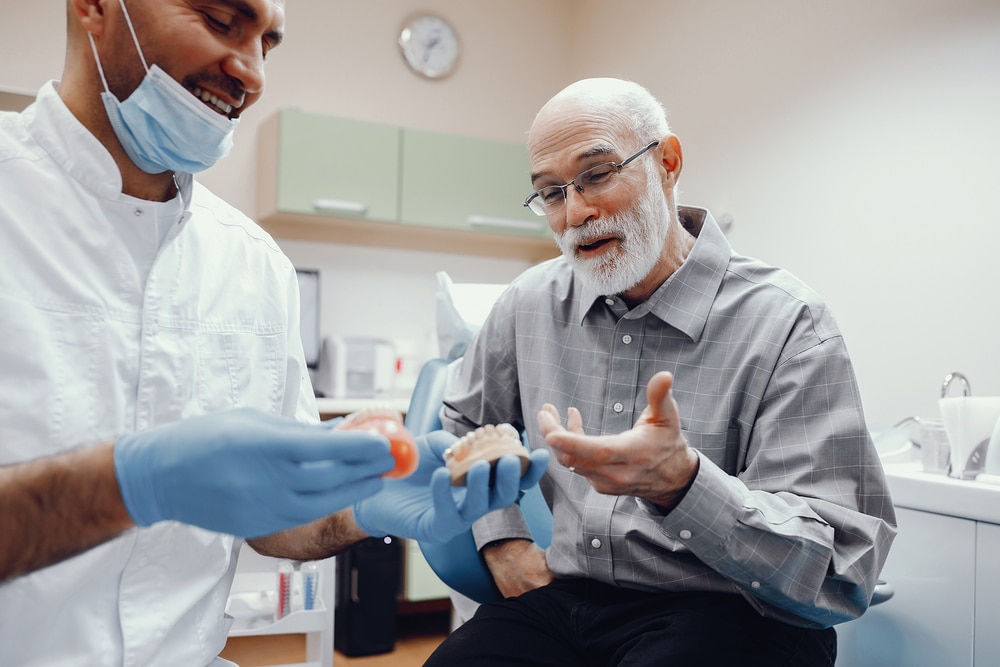Are you currently experiencing difficulties with chewing, speaking, or missing teeth? Do you feel self-conscious about your smile? If so, consider exploring dental implant options in California.
It’s estimated that over 30 million Americans are missing one or more teeth in either jaw. By the age of 74, 26% of adults have lost their entire set of permanent teeth. Furthermore, between the ages of 35 and 44, approximately 69% of adults have at least one missing tooth due to various factors such as gum disease, trauma, tooth decay, or a failed root canal.
Dental implants have emerged as a highly effective solution for replacing missing teeth and restoring both functionality and aesthetics to the smile. In fact, they stand out as the most viable option when it comes to fully recovering complete bite function while also supporting the health of the jawbone and any remaining teeth.
What Are Dental Implants?
Dental implants are meticulous installments that are used to re-establish the root of a missing tooth. The titanium screws and cylinders are secured into the jawbone, where they can reinforce a single crown, a dental bridge, or even partial or full dentures.
The skilled oral surgeons at Sacramento Surgical Arts possess extensive expertise in the field of dental implants, gained through years of dedicated practice and experience in both placement and restoration.


Why Choose Dental Implants?
There are a number of reasons to consider dental implants, including:
- To re-establish the aesthetic look of your smile and facial features
- To recover one or more missing teeth without impairing other teeth
- To clear up bite issues or joint discomfort caused by shifting teeth
- To brace/protect a bridge or denture and aid in overall comfort
- To rebuild chewing function, digestion, and speech function
The Causes Of Tooth Loss
- Gum disease
- Tooth decay
- Failed root canals
- Overuse
- Accidents
- Genetic defects


What Will Happen If I Do Not Receive Treatment?
Neglecting to replace a missing tooth can lead to self-consciousness when smiling or speaking. Additionally, tooth loss can significantly impact essential activities like eating, potentially resulting in health problems such as malnutrition. You may also encounter bone deterioration if you lack teeth. Insufficient stimulation from tooth roots can lead to bone degradation, resulting in a weakened jawbone that may not provide enough stability for future dental implants. In addition, the absence of teeth can result in spacing problems as surrounding teeth attempt to naturally close the gaps. These gaps can create challenges that interfere with proper oral hygiene, potentially leading to the development of gum disease.
It is crucial to address missing teeth promptly to maintain overall well-being and confidence.
Should You Get Dental Implants?
In several cases, implants have proven to be longer-lasting than dentures or bridges. Singular implants can support crowns replacing an individual missing tooth. Dental implants are also capable of acting as a brace on a dental bridge, aiding in the replacement of several teeth. Individuals who have full dentures often struggle with stability and pain, which in turn limits their oral function. Dental implants, set to aid in support of a denture, can lessen discomfort and give you the ability to chew with less difficulty.
Dental implants have been successfully used for more than 30 years. Studies are uninterruptedly showing success percentages over 95%.


How To Get Dental Implants
The purpose of dental implants is to provide both a functioning and supportive connection between the dental implant and your bone. This procedure is done through what is called osseointegration, which fastens the root of the dental implant to your jaw bone.
Step One
Our surgeon will do a comprehensive oral exam and evaluate the condition that your primary dentist has referred you for. This will include but may not be limited to:
- Review of your medical and dental history
- Dental examination
- Bite examination
- Measurement of jawbones height and length
- Anatomic features are located (nerve locations and proximity of sinuses)
- Oral x-rays
- Three-dimensional scans of bone
If we feel you are a suitable recipient for dental implants, a medical treatment strategy will be put in place for you, and choices of anesthesia will be discussed. After this, an appointment to start the treatment plan can be made.
Step Two
Our provider will have to prepare the location where the tooth is lacking before setting the implant. This may include eliminating excessive gum tissues or bone, as well as rebuilding and reshaping areas of bone.
Step Three
During surgery, we will set the implant (a tiny titanium post) into your jawbone and let it heal to reinforce the jawbone. This entire process typically takes anywhere from three to six months. A semi-permanent tooth can be set in your mouth while the implant is healing.
Step Four
When the implant has been reinforced to the jawbone, the permanent replacement tooth can then be set on top of the implant by our team or your specialist dentist. When dentures are involved, your dentist will secure the implants to the denture.
Dental Implant Maintenance
Dental implants adhere to your bone; therefore, crowns adhered to your implants will look and function similarly to your natural teeth. Remember, when cleaning the implants, you need to use the correct oral hygiene techniques that you use on your own natural teeth.
In various cases, doctors will prescribe a mouth rinse to be used daily. If you are unable to maintain good oral care, your dental implants may fail.
Give us a call today to make an appointment with a California oral surgeon.
